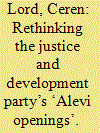| Srl | Item |
| 1 |
ID:
111685


|
|
|
|
|
| Publication |
2012.
|
| Summary/Abstract |
This study uses the case study of a 'transitioning' country, Turkey, in exploring institutional endurance and change. In this context it uses the framework of Arend Lijphart's majority and consensus democracy in order to uncover patterns of institutional evolution and persistence which have implications for the nature of its democratic transition. This is achieved through a step-by-step exploration of the key dimensions of democracy discussed by Lijphart. This empirical study seeks to demonstrate that despite the introduction of anti-majoritarian institutions in 1961, Turkey has never consolidated consensus democracy. Instead, since 1982 the trend has been a move towards a system more in line with the majoritarian regime established under the 1924 constitution. As such, the study offers a useful case study of the dynamics of political transformation in the face of institutional persistence, suggesting a need for tracing the history if we are to identify institutional patterns in contrast to the more generalized democratization frameworks.
|
|
|
|
|
|
|
|
|
|
|
|
|
|
|
|
| 2 |
ID:
152450


|
|
|
|
|
| Summary/Abstract |
The ‘Alevi openings’ launched in 2007 by the Justice and Development Party have been widely lauded as a historic and unprecedented step in the Turkish Republic. In contrast, this article places the ‘openings’ in a wider historical context, analyzing them in relation to processes of nation-building. Firstly, it is argued that the ‘openings’ marked continuity with previous interventions by state actors, including the military, dating back at least to the 1960s. Secondly, it is contended that these interventions should be regarded as a process of re-framing Alevism within a Turkish–Islamic framework, consigning it to ‘invisibility,’ rather than as democratization.
|
|
|
|
|
|
|
|
|
|
|
|
|
|
|
|
| 3 |
ID:
165785


|
|
|
|
|
| Summary/Abstract |
This article examines the growth of sectarianism in Turkish politics since the 2011 Arab uprisings, particularly when it comes to the government's portrayal of the Alevi community as a security threat. Comparable to elsewhere in the Middle East, this "sectarianized securitization" of domestic politics was catalyzed by the overlap of external geopolitical competition and internal challenges to the government. These dynamics are situated within the context of longer-term processes of nation-building, the nature of Islamic authority, and the increasing prominence of Islamists.
|
|
|
|
|
|
|
|
|
|
|
|
|
|
|
|